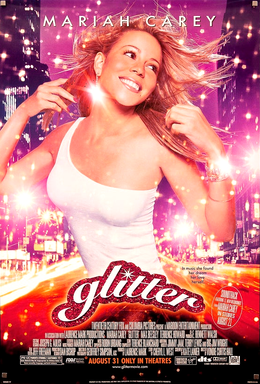
Glitter is a 2001 American romantic musical drama film starring Mariah Carey and rapper Da Brat, written by Kate Lanier, and directed by Vondie Curtis Hall. Carey plays Billie Frank, an aspiring singer who, along with her friends Louise and Roxanne, is a club dancer. Timothy Walker offers them a contract as backup singers/dancers to another singer. At the premiere of the song they record, Billie meets Julian "Dice" Black, a nightclub DJ, who helps her in her solo career. In the process, Billie and Dice fall in love.

"Can't Take That Away (Mariah's Theme)" is a song recorded by American singer and songwriter Mariah Carey for her seventh studio album Rainbow (1999). The song was written by Carey and Diane Warren, and produced by Carey and Jimmy Jam and Terry Lewis. It was released as the fourth single from Rainbow and a double A-side with "Crybaby" on April 17, 2000, by Columbia Records. The song is a ballad, blending pop and R&B beats while incorporating its sound from several instruments including the violin, piano and organ. Lyrically, the song speaks of finding inner strength, and not allowing others to tear away your dreams.

"Thank God I Found You" is a song by American singer-songwriter Mariah Carey, featuring guest vocals from R&B singer Joe and American boy band 98 Degrees. It was released on November 15, 1999, through Columbia Records, as the second single from her seventh studio album, Rainbow (1999). Written and produced by Carey alongside Jimmy Jam and Terry Lewis, the song is a soulful pop power ballad with lyrics depicting a powerful love relationship in which the protagonist tells her lover "thank God I found you", that was inspired by a relationship Carey was going through at the time.

"Heartbreaker" is a song by American singer-songwriter Mariah Carey featuring American rapper Jay-Z for her seventh studio album Rainbow (1999). It was released on August 23, 1999, by Columbia Records as the lead single from Rainbow. The song was written by the artists and produced by Carey and DJ Clue, with additional writers being credited for the hook being built around a sample from "Attack of the Name Game" by Stacy Lattisaw. "Heartbreaker" pushed Carey even further into the R&B and hip hop market, becoming her second commercial single to feature a rapper. Lyrically, the song talks about a relationship from the female perspective, and how the protagonist incessantly returns to her lover, even though he continuously cheats on her and breaks her heart.
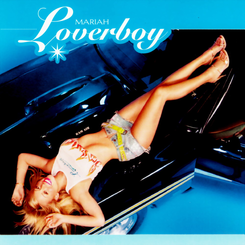
"Loverboy" is a song by American singer and songwriter Mariah Carey. It was released on June 19, 2001, by Virgin Records America as the lead single from her eighth studio album Glitter, the soundtrack to the 2001 film of the same name. Written and produced by Carey, Larry Blackmon, Thomas Jenkins and Clark Kent, "Loverboy" is built around a sample from "Candy" by the funk band Cameo, who are also featured on the track. Lyrically, the song finds Carey fantasizing about her loverboy, a man that will fulfill her physical and sexual desires. The recording was accompanied by an official remix, titled "Loverboy Remix", featuring guest artists Ludacris, Da Brat, Shawnna and Twenty II.
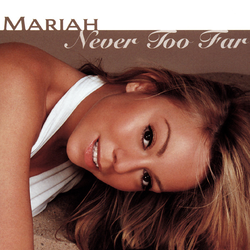
"Never Too Far" is a song recorded by American singer and songwriter Mariah Carey for her first soundtrack and eighth studio album Glitter (2001). It was written and produced by herself and Jimmy Jam and Terry Lewis. The song was released as the album's second single on August 14, 2001 by Virgin Records. The song is a mid-tempo ballad which lyrically deals with heartbreak. "Never Too Far" was used on the charity single "Never Too Far/Hero Medley", which combines the first verse of the song with a re-recorded version of the first verse and bridge of Carey's previous single "Hero" (1993).

"Never Too Far/Hero Medley" is a medley recorded by American singer and songwriter Mariah Carey, first released as a charity single on December 11, 2001, through Virgin Records America and is included in the Japanese release of Carey's second compilation album, Greatest Hits (2001). The medley combines the first verse and chorus of "Never Too Far", co-written and co-produced by Carey and Jimmy Jam and Terry Lewis, with a re-recorded version of the first verse, chorus and bridge of "Hero", written and produced by Carey and Walter Afanasieff. As the latter did not receive co-production credits due to the change in instrumentation, Randy Jackson was named as producer alongside Carey instead. The single was meant to express a message of unity and love in the aftermath of the September 11 attacks.

American singer Mariah Carey has released 86 official singles, 22 promotional singles, and has made 30 guest appearances. Her self-titled debut album in 1990 yielded four number-one singles on the Billboard Hot 100, the first being "Vision of Love", a song credited with revolutionizing the usage of distinguished vocal stylings, predominantly the practice of melisma, and effectively influencing virtually every female R&B performer since the 1990s. Subsequent singles "Emotions" (1991) and Carey's cover of the Jackson 5 track, "I'll Be There" (1992) continued the singer's streak of US number-one singles, with the latter becoming her fourth chart-topper in Canada and first in the Netherlands. With the release of Carey's third studio album, Music Box (1993), the singer's international popularity surged upon release of "Hero" and the album's third single, her cover of Harry Nilsson's "Without You", which became the singer's first number-one single in several countries across Europe.
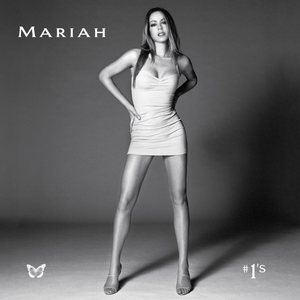
#1's is the first greatest hits album by American singer-songwriter Mariah Carey, released by Columbia Records on November 17, 1998. The album contained Carey's then thirteen number-one singles on the Billboard Hot 100, as well as four new songs. In Japan, the album also included her popular single, "All I Want for Christmas Is You", which was Carey's biggest selling single there.

"Hero" is a song by American singer-songwriter, and record producer Mariah Carey released on October 18, 1993, via Columbia Records as the second single from her third studio album, Music Box (1993). The song was originally recorded by Gloria Estefan. The song was written and produced by Carey and Walter Afanasieff. While writing the song, Carey did not connect to its style or sound, therefore forfeiting it over to Estefan who sang it for the soundtrack of the film of the same name (1992). However, after being convinced by Sony executive Tommy Mottola to keep it, she changed some of the lyrics to more precisely fit her personality. Lyrically, the song is regarded as one of Carey's most inspirational and personal ballads, with its protagonist declaring that even though people may feel discouraged or down at times, in reality, they are "heroes" if they look inside themselves and see their own inner strength; in time, it will help them "find the way".

"Fantasy" is a song by the American singer-songwriter Mariah Carey. It was released on August 23, 1995, by Columbia Records as the lead single from her fifth album, Daydream (1995). The track was written and produced by Carey and Dave Hall. It samples Tom Tom Club's 1981 song "Genius of Love". The lyrics describe a woman who is in love with a man, and how every time she sees him she starts fantasizing about an impossible relationship with him. The remix for the song features rap verses from Ol' Dirty Bastard, something Carey arranged to assist in her crossover into the hip-hop market and credited for introducing R&B and hip hop collaboration into mainstream pop culture, and for popularizing rap as a featuring act.

"Always Be My Baby" is a song recorded by American singer-songwriter, and record producer Mariah Carey for her fifth studio album, Daydream (1995). It was released by Columbia Records on February 20, 1996, as the third single in the United States and fourth worldwide. Written and produced by Carey, Jermaine Dupri and Manuel Seal, "Always Be My Baby" is a midtempo song, with lyrics describing the feeling of attachment and unity the singer feels towards her estranged lover, even though they are no longer together, she says he will always be a part of her and will "always be her baby" even after they move on.
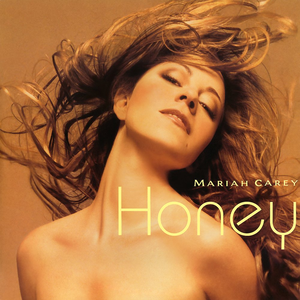
"Honey" is a song by American singer and songwriter Mariah Carey from her sixth studio album, Butterfly (1997). It was released as the lead single from Butterfly on July 29, 1997, by Columbia Records. The song was written and produced by Carey, Sean Combs, Kamaal "Q-Tip" Fareed and Steven "Stevie J" Jordan. The song samples "Hey DJ" by World-Famous Supreme Team and "The Body Rock" by the Treacherous Three. "Honey" was a redefining song in Carey's career, pushing her further into the hip hop scene.

"Say Somethin'" is a song by American singer and songwriter Mariah Carey. It was written by Carey, Snoop Dogg, Chad Hugo, and Pharrell Williams, and produced by The Neptunes as the sixth and final single from Carey's tenth studio album, The Emancipation of Mimi (2005). The song is one of few from Carey's catalog in which she does not share production credits. "Say Somethin'" features Dogg as a guest artist, and is influenced by R&B and hip-hop music genres. Lyrically, the song is a dialogue in between and male and female, that discuss sexual themes and acts of which they plan to engage in a restroom.

Glitter is the soundtrack to the 2001 film of the same title and the eighth studio album by American singer-songwriter Mariah Carey. It was released on August 18, 2001, in Japan by Sony Music and in the United States on September 11, 2001, by Virgin Records. Mixing dance-pop, funk, hip hop and R&B, the album was a complete musical departure from any of Carey's previous releases, focusing heavily on recreating a 1980s post-disco era to accompany the film, set in 1983. By covering or heavily sampling several older tunes and songs, Carey created Glitter as an album that would help viewers connect with the film, as well as incorporating newly written ballads. The singer collaborated with Jimmy Jam and Terry Lewis and DJ Clue, who co-produced the album. Musically, Glitter was structured to be a retro-influenced album and have more of a dance-oriented element. On several songs, critics noted Carey to be more sexually suggestive lyrically than before. Glitter featured several musical acts such as Eric Benét, Ludacris, Da Brat, Busta Rhymes, Fabolous, and Ja Rule.

"Fly Like a Bird" is a song by American singer and songwriter Mariah Carey, released on March 13, 2006, by Island Records as a single from her tenth studio album, The Emancipation of Mimi (2005). Written and produced by Carey and James "Big Jim" Wright, the song is influenced by Gospel, soul, and R&B music genres. Its arrangement is built on piano chords and guitar melodies, and features Carey's pastor Clarence Keaton, who recites two Biblical verses during the song's introduction and bridge. Carey described "Fly Like a Bird" as the most personal and religious track from The Emancipation of Mimi, with its lyrics featuring a veritable prayer to God: "Fly like a bird, take to the sky, I need you now Lord, carry me high!".

"Don't Forget About Us" is a song by American R&B singer and songwriter Mariah Carey. It was written by Carey, Jermaine Dupri, Bryan-Michael Cox and Johntá Austin, and produced by Carey, Dupri and Cox. It was released as the fifth single on October 10, 2005, by Island Def Jam, from the reissue of her tenth studio album, The Emancipation of Mimi (2005), subtitled Ultra Platinum Edition. It is also the first single released from the reissue. The song is influenced by R&B and hip hop soul music genres, and lyrically chronicles the emotions felt by the protagonist after the loss of their relationship. Carey explained that the true meaning of the song is to be interpreted by the listener, therefore not disclosing its entire meaning publicly.

"Funkin' for Jamaica (N.Y.)" is a 1980 single by jazz trumpeter Tom Browne. The single—a memoir of the Jamaica neighborhood in the New York City borough of Queens where Browne was born and raised—is from his second solo album, Love Approach. Browne got the idea for the song while he was at his parents' home. The vocals for the single were performed by Toni Smith, who also helped compose the song. The song hit number one on the US Billboard R&B chart for a month. "Funkin' for Jamaica" peaked at number nine on the dance chart and made the Top 10 on the UK Singles Chart, but it never charted on the Billboard Hot 100.

The discography of American rapper Mystikal consists of five studio albums, one independent album, two compilation albums, twenty-five singles and fifteen music videos. In 1994, Mystikal released a self-titled album on the independent record label Big Boy. Following his signing to Jive Records in 1995, the album was re-released under the title Mind of Mystikal as his debut studio album. Mind of Mystikal peaked at number 103 on the US Billboard 200 and at number 13 on the US Top R&B/Hip-Hop Albums chart. The album featured the single "Y'all Ain't Ready Yet", which peaked at number 41 on the US Hot R&B/Hip-Hop Songs chart. Mystikal's following two studio albums, Unpredictable and Ghetto Fabulous, were both released on the record label No Limit Records; Jive distributed the albums rather than No Limit's distributor, Priority Records. Both peaked in the top five of the Billboard 200 and were later certified platinum by the Recording Industry Association of America (RIAA). Each of the albums featured one single, "Ain't No Limit" and "That's the Nigga", respectively. Both songs peaked in the top 65 of the Hot R&B/Hip-Hop Songs chart.





















